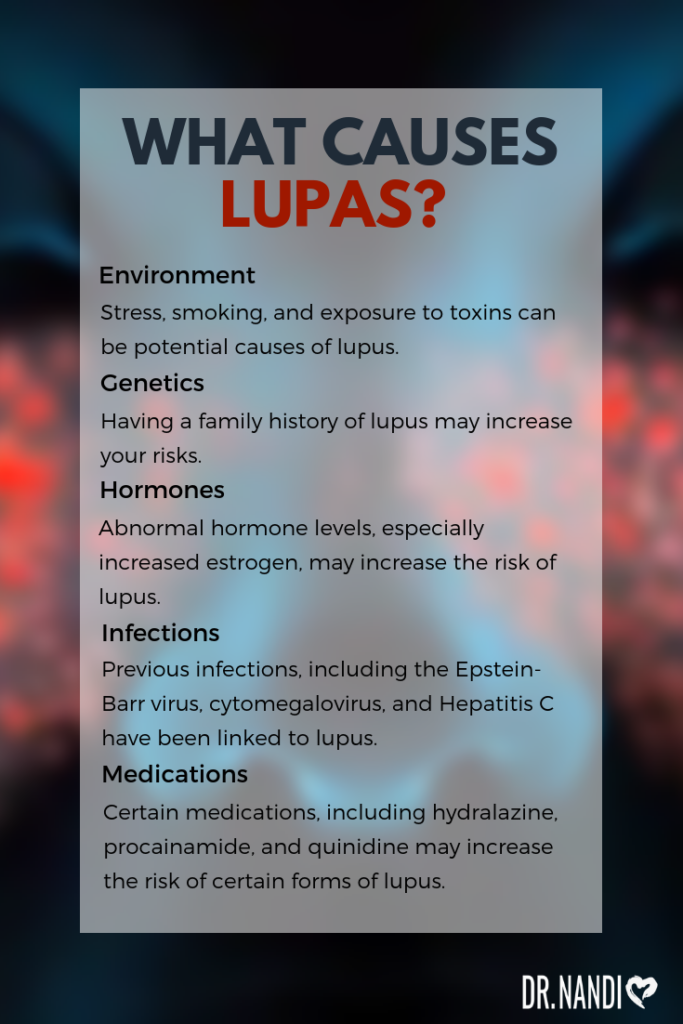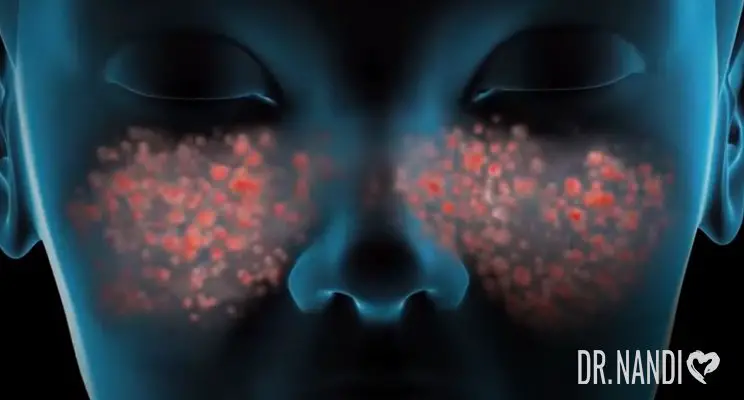WHAT IS LUPUS? SYMPTOMS, CAUSES & SOLUTIONS
According to The Lupus Foundation of America, about 1.5 million Americans suffer from the autoimmune disease known as Lupus. The number of cases has been constant throughout the years since the first survey was conducted in 1994. (1)
This article will discuss what lupus is, its symptoms, causes, and possible solutions, but first, let’s talk about the immune system.
What is the immune system?
Most of us do not think much about our immune system when we are feeling well. However, when illness strikes, we become all too aware of it. The immune system plays a vital role in protecting our bodies from diseases caused by harmful substances, germs (bacteria, viruses, parasites, fungi), and cellular changes.
The immune system has two main parts:
- The innate immune system, we are born with it
- The adaptive immune system develops when the body gets exposed to foreign organisms such as microbes. (2)
The immune system is formed by various organs, cells, and chemicals that help fight disease. The principal parts of the immune system are:
- The lymphatic system
- The complement system
- The spleen
- The thymus
- The bone marrow
- The antibodies
- The white blood cells (3)
While all the immune system components are essential, white blood cells are crucial elements in supporting the immune system. They travel all over the body, searching for possible attackers, and launch an immune attack against the threatening disease when a potential intruder is found. White blood cells contain lymphocytes such as T-cells, B-cells, natural killer cells, and various other types of immune cells.
What Is Lupus?
Lupus is a long-term chronic disease, causing inflammation, pain, and tissue damage in organs throughout the body. Lupus is an autoimmune illness where the body mistakenly perceives healthy normal cells as dangerous foreign cells and attacks them.
Lupus is a disease that affects the entire body resulting in inflammation in various organs and tissues, including the following:
- Joints
- Skin
- Kidneys
- Heart
- Brain
- Lungs
- Blood
While some people only experience a mild version of lupus, others have more severe symptoms and consequences. Since lupus affects so many vital organs, it can become severe and lead to permanent organ damage and even turn life-threatening.
Lupus affects 1.5 million Americans and about 5 million people worldwide. Most people develop it between ages 15 and 44. It mostly affects women of childbearing age, although it can develop among children, teenagers and men. In addition, Caucasian women are 2-3 times more likely to have it than other ethnicities. Lupus is not a contagious disease. (1, 2, 3, 4, 5)
Interested in learning more about the various aspects of the immune system, and how they affect your overall health? Join the community to receive Dr. Nandi’s free newsletter, packed with ways to understand the body and facilitate good health.
What Are The Symptoms Of Lupus?
Symptoms of lupus can differ according to the affected individual’s situation. Symptoms can be experienced permanently, disappear suddenly or flare up on occasion. (5)
Individuals with lupus may experience various symptoms depending on which organs are impacted by the disease. However, some of the most recurrent symptoms are:
- Fatigue
- High fever
- Joint pain, stiffness, and swelling
- Body aches
- Butterfly rash that covers the cheeks and bridge of the nose
- Skin lesions that emerge or gets worse with sun exposure
- Shortness of breath
- Sjogren’s syndrome, chronic dry eyes, and dry mouth
- High blood pressure
- Headaches
- Pericarditis and pleuritis (pleuritis), both can cause chest pain
- Memory loss
- Confusion
Furthermore, people who have lupus may experience photosensitivity. Those who are afflicted tend to be highly sensitive to the UV radiation present in sunlight and some artificial lighting too. When individuals with lupus have photosensitivity, they may present with rashes, internal swelling, joint pain, and fatigue. Therefore, it is essential to protect themselves when exposed to the sun. (4, 5, 6, 7)
What Causes Lupus?
The exact cause of lupus is currently unknown. It seems that lupus can be a manifestation of a combination of the following areas:
- Environment: Researchers have pointed out that stress, smoking, and exposure to toxins like silica dust can be potential causes of lupus.
- Genetics: Having a family history of lupus may increase your risks. Also, investigations have shown at least 50 genes that are believed to contribute to the disease.
- Hormones: Abnormal hormone levels, especially high estrogen levels, may increase the risk of lupus.
- Infections: Healthcare providers are still evaluating the impact of previous diseases like Epstein-Barr virus, cytomegalovirus, and Hepatitis C have to lupus.
- Medications: Certain medications, including hydralazine, procainamide, and quinidine, may increase the risk of certain forms of lupus.
However, there have been cases where none of the above causes are present in the person suffering from this autoimmune disease. (8)

Types Of Lupus
Professionals within the healthcare sector usually categorize lupus in the following main types:
- Systemic lupus erythematosus (SLE): It is the most common type of lupus, 70% of people with lupus have SLE. It can range from mild to severe, potentially worsening over time and then improving again.
- Cutaneous lupus: About two-thirds of the population affected by lupus will likely develop some skin disease that can cause rashes and permanent lesions with scarring in the legs, arms, neck, ears, and face areas. Reactions can get worse when exposed to UV natural or artificial light. The types of cutaneous lupus are:
- Chronic cutaneous lupus erythematosus (CCLE): Characterized by a purple or red rash. It can cause discoloration of the skin, scarring, and hair loss.
- Discoid Lupus Erythematosus (DLE): It presents as round sores commonly located in the scalp or face, and they are generally not itchy or painful.
- Subacute cutaneous lupus erythematosus (SCLE): Presented as ring-shaped cutaneous lesions, they can appear in the arms, shoulders, neck, and body. These lesions usually do not end up in scarring, however, they can present discoloration.
- Neonatal lupus: This is a rare condition that affects infants whose mothers have lupus. Symptoms may include skin rash, low blood count, liver problems, or heart defects in newborns. In most cases, these symptoms go away after a few months.
- Drug-induced lupus: This type of lupus has been observed more in men because the medications associated with the disease are usually prescribed to them. The drugs associated with lupus are:
- Hydralazine (prescribed to treat high blood pressure or hypertension)
- Procainamide (used to treat irregular heart rhythms)
- Isoniazid (utilized to treat tuberculosis)
It may take one to two years of continuous use of these drugs to develop lupus. However, from those taking procainamide, 20% will develop drug-induced-lupus, while the percentage is much lower with the other drugs. (5)
Diagnosis Of Lupus
Diagnosis starts with a physical exam, health history, and understanding of your symptoms. Further diagnostic tools may involve (3, 5):
- Blood test: A complete blood count, erythrocyte sedimentation rate, protein levels, and antinuclear antibody test.
- Imaging: Chest x-ray and echocardiogram.
- Tissue biopsy: Sample from a lupus-like rash.
- Kidney biopsy: To check for kidney damage due to lupus.
Adequate diagnosis is made based on the person’s symptoms and test results. (9)
Is Lupus Curable?
Currently, lupus has no cure. However, there are options to manage it or even experience remission. Around 80 to 90 percent of people living with lupus reach the normal expected lifespan. (1, 5)
Treatment And Solutions For Lupus
Though there is no cure for lupus, a treatment plan may involve medication, lifestyle changes, and dietary recommendations. (10, 11, 12)
Medication
Your doctor may recommend one or some of the following medications:
- Nonsteroidal anti-inflammatory drugs (NSAIDs)
- Antimalarial medication
- DHEA
- Corticosteroids
- Immunosuppressive drugs
Lifestyle
In addition to medication, your physician may suggest some lifestyle strategies, like:
- Ultraviolet sunlight expose
- Avoiding direct sunlight
- Stop alcohol and tobacco consumption
- Sleep 7-8 hours a day minimum
- Reduce stress (meditation, journaling, breathing and relaxation techniques, etc. are great tools)
- Regular exercise, at least 20-30 minutes 5 days a week.
Supplements
Supplements your healthcare provider may advise to include can be:
- Fish oil
- Flaxseed
- Vitamin B
Diet
Aiming to reduce inflammation for managing lupus symptoms, physicians advocate for a healthy diet. They strongly advise removing processed foods, refined sugars, artificial ingredients, and eating organic whenever possible. An anti-inflammatory whole foods diet filled with greens, vegetables, fruits, nuts, seeds, and high-quality, free-range, organic animal products may help relieve lupus symptoms. Furthermore, identifying food allergies and sensitivities is crucial.
Lupus is an autoimmune condition that causes inflammation in many essential organs and tissues in the body. While lupus has no cure and can lead to severe organ damage, proper treatment, lifestyle, and dietary changes can make it possible to manage symptoms and reduce flare-ups, allowing for a lively and fulfilling life.
Frequently Asked Questions
Q. Can a person die from lupus?
A. Someone cannot die directly from lupus. However, lupus can lead to severe organ damage that can result in death in some cases.
Q. Is having lupus serious?
A. While lupus is a serious autoimmune condition, 80 -90% of patients can live an expected lifespan with proper treatment.
Q. What is the first sign of lupus?
A. The first signs of lupus may differ case by case, but usually, it involves joint pain and stiffness.
Q. Does lupus have a cure?
A. No, at this point, lupus doesn’t have a cure, but it can be managed.
Q. Is lupus a disability?
A. It depends. Many people can live life avoiding disability through treatment and lifestyle. Lupus can also lead to severe damage to the body over time, leading to disability in some cases.
Q. Is lupus like cancer?
A. No, lupus is not like and is not related to cancer.
Q. Is lupus like HIV?
A. No, lupus is not like and is not related to HIV. Lupus is an autoimmune condition that causes inflammation in many essential organs and tissues in the body. While lupus has no cure and can lead to severe organ damage, proper treatment, lifestyle, and dietary changes make it possible to manage lupus symptoms and reduce flares to live a fulfilling life.
For more advice on treatments, ideas, and solutions for living with lupus, join the community to receive Dr. Nandi’s periodic newsletter.
References:
- https://resources.lupus.org/entry/facts-and-statistics
- https://www.ncbi.nlm.nih.gov/books/NBK279396/
- https://www.ncbi.nlm.nih.gov/books/NBK279395/
- https://www.ncbi.nlm.nih.gov/books/NBK279364
- https://resources.lupus.org/entry/what-is-lupus
- https://www.arthritis.org/diseases/sjogrens-syndrome
- https://www.mayoclinic.org/diseases-conditions/lupus/symptoms-causes/syc-20365789
- https://www.lupus.org/resources/what-causes-lupus
- https://www.cdc.gov/lupus/basics/diagnosing.htm
- https://www.womenshealth.gov/lupus/living-lupus
- https://resources.lupus.org/entry/diet-or-nutrition-plan
- https://www.hopkinslupus.org/lupus-treatment/lupus-medications/


















